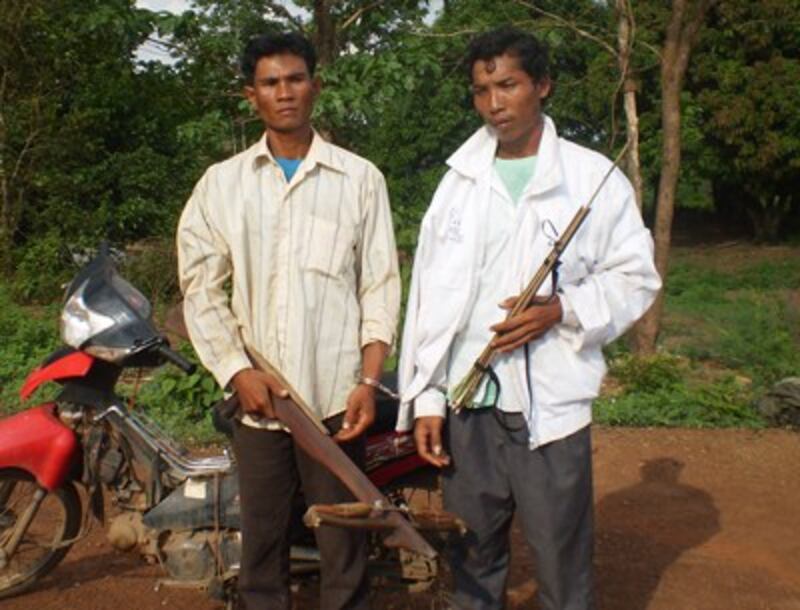Updated at 10:35 a.m. EST on 2012-08-21
A Cambodian activist sought by authorities for allegedly masterminding a plot by villagers to secede from Cambodia claims he is innocent and only acted on behalf of residents to save their land from encroachment by a foreign concession company.
Bun Ratha denied government claims that he had led villagers from Kratie province’s Chhlong district in a clash with armed military personnel in May as part of an effort to establish a self-governing zone.
Speaking from an undisclosed location, the land activist said he was “framed” by the government and that he had only acted as a representative of the Broma villagers in Kompong Damrey commune who had rejected demands to vacate their farmland for several months.
“This is only Hun Sen’s excuse to blame me,” he said, referring to Cambodia’s prime minister, who had condemned the dispute in a nationally-televised speech two weeks ago.
“What I did was to demand land for the villagers.”
Cambodian authorities have said that the government owns the land in Broma village, but activists contend that it had already been awarded as a concession to Russian firm Casotim, which plans to set up a rubber plantation.
Activists say the villagers have been farming the land for years.
In May, the land row sparked a clash as a large number of military personnel carrying guns tried to disperse more than 1,000 families, leaving 15-year-old Heng Chentha dead after she was struck by a bullet authorities say ricocheted after it was fired as a warning shot. Some of the villagers were armed with axes and crossbows.
Bun Ratha and fellow activists fled the scene.
The land activist said that he had defended the Broma villagers in their actions against Casotim, but rejected suggestions that he had organized a movement for the more than 1,000 families whose land was allegedly targeted by the Russian firm.
He noted that authorities arrested him in April after demonstrating villagers destroyed some of Casotim’s property, but that he had later been released from the provincial prison after the protesters blocked off a national highway.
“If I was a mastermind in establishing the self-governing zone, they would not have released me [in April],” he said.

Acted alone
Bun Ratha also dismissed government claims that he had received assistance from Cambodian Human Rights and Development Association (ADHOC) activist Chan Soveth or Association of Democrats leader Mam Sonando, both of whom have faced judicial action for their roles in the land dispute.
“I never used any help from associations when I held meetings with the villagers,” he said, adding that he had done so of his own free will.
He said that the villagers had only connected with the Association of Democrats when he asked the group to provide food and other assistance for those affected by forced evictions at the site.
Bun Ratha challenged the government to search documents from the two groups, which he said would prove that he is not a member of either organization.
Last week, a municipal court in Phnom Penh summoned Chan Soveth to answer charges that he illegally aided Bun Ratha in Broma village in violation of Article 544 of the Penal Code. If convicted, he faces one to three years imprisonment and a fine of U.S. $500 to U.S. $1,500.
Mam Sonando was recently arrested and accused of sparking the land revolt and the ensuing clashes in Broma village. He faces 30 years imprisonment if convicted on all charges.
According to Cambodia’s Ministry of the Interior, the Broma villagers are a “group of anarchists” who Bun Ratha “forced” into creating an autonomous “squatter zone.”
A consortium of more than 20 Cambodian human rights groups condemned the Cambodian judicial system for pursuing “politically-motivated” charges against the activists involved in the land dispute, referring to the decision as the “decade’s most serious threat to human rights work in Cambodia.”
Reported by Sum Sok Ry for RFA’s Khmer service. Translated by Samean Yun. Written in English by Joshua Lipes.
CORRECTION: An earlier version of the story stated that Bun Ratha was director of the Democrat Association. Bun Ratha is not a member of the association or the Association of Democrats as the group is officially called.

